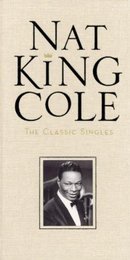| All Artists: Nat King Cole Title: The Classic Singles Members Wishing: 1 Total Copies: 0 Label: Capitol Original Release Date: 1/1/2003 Re-Release Date: 11/4/2003 Album Type: Box set, Original recording remastered Genres: Jazz, Pop, Broadway & Vocalists Styles: Swing Jazz, Traditional Jazz & Ragtime, Vocal Jazz, Easy Listening, Oldies, Vocal Pop, Classic Vocalists, Traditional Vocal Pop Number of Discs: 4 SwapaCD Credits: 4 UPC: 724359205526 |
Search - Nat King Cole :: The Classic Singles
 | Nat King Cole The Classic Singles Genres: Jazz, Pop, Broadway & Vocalists
|
Larger Image |
CD Details |
CD ReviewsBear Family, where are you? Andrew R. Prets | 12/06/2003 (3 out of 5 stars) "If you're a die hard collector of Nat "King" Cole recordings you may look at the contents of this collection and fantasize about finally having stereo versions of some of his 60's material that has NEVER been released on LP or CD in stereo. Well, forget it. Only two tracks on cd four ("Let There Be Love" and "Dear Lonely Hearts") are in stereo. Not even "Stardust" and "When I Fall In Love" which were among the first tracks recorded by Capitol in stereo are in stereo here! In all fairness it should be mentioned that they did go back to the original masters for "You Made Me Love You" and "Let True Love Begin" instead of using the putrid David Cavanaugh rhythm track versions we've been stuck with since Mr. Cole's death but they're not in stereo. In fact, that in itself is ironic because the notes include a picture of the stereo EP that contained "You Made Me Love You"! As for the rest, you probably have everything on cd one because you probably have the Mosaic box. There are 4 or 5 nice rarities on cds two and three but you've got everything else. When oh when will Bear Family in Germany step in and do for Nat "King" Cole and Perry Como what they did for Dean Martin, Doris Day, Rosemary Clooney etc.? We seem to be incapable of it in the US." WHAT A DISAPPOINTMENT... bispro | France | 12/30/2003 (3 out of 5 stars) "Nat King Cole was one of the top performers of the 20th century, but it seems like only Capitol fails to realise that. They are the guardians of his musical legacy, the ones that have the responsibility of making his music live on well into the 21st century, and what do they give us? Compilation after compilation of previously released material (when hundreds of unreleased tracks still lay dormant in their vaults),and when they finally come up with an interesting project, they mess it up with average sound quality!I wouldn't quite agree with the notion, expressed by another reviewer, that Capitol should leave the Nat Cole material solely in the hands of their Capitol Jazz label... Capitol Jazz has excellent releases, liner notes, packaging, etc. (The 'Billy May sessions' 2-CD set, for instance, is brilliant), but it doesn't mean that plain Capitol isn't capable of equaling that quality, even surpassing it, given the right budget and an able team of archivists and reviewers (the 'Complete Capitol Singles' by Sinatra is a case in point). Only problem is, Sinatra sells more than Cole, and so they refuse to invest the same amount of money on an artist that is not so "cost-efficient"...What a disgrace that they forgot where they come from... Capitol Tower, the symbol in their logo and headquarters for more than half a century, was described at its creation as "the house that Nat Cole built", referring to the huge popularity of his Trio recordings that gave the label its biggest revenue in the 1940s.The Nat King Cole catalog on Capitol has been artificially divided between the two labels. Why not leave the Trio era recordings to Capitol Jazz and the later, solo recordings to the main label? After all, they are exactly in the same vein as the Sinatra recordings of the same period!As for this here collection, I still dream of two separate singles sets: 'the Trio years'containing all Trio single sides, and 'the Solo years', covering the second half of his career. Stereo recordings whenever possible, all the sides (there were quite a few, but real fans would agree to pay a little more for it). Not only Nat deserves this, but his fans do, too... and the 21st century music listeners deserve to discover the legacy of one of the most extraordinary vocalists and pianists of all time." A great listen from start to finish Scott N. Burton | Bridgeport,CT USA | 09/18/2004 (5 out of 5 stars) "Along with Bing Crosby & Frank Sinatra,Nat King Cole was,hands down,one of the greatest American singers of the 20th century-I read a very positive review of this anthology in Goldmine magazine & decided to purchase it-This collection starts off with the recordings he made with his King Cole trio-Disc 2 features the songs that made his solo career memorable-Four of the songs on this disc were #1 in Billboard:"I Love You For Sentimental Reasons","Nature Boy","Mona Lisa",& "Too Young"-Some of the other standout tracks include "Walkin My Baby Back Home","Unforgettable","Smile",(written by Charlie Chaplin),"Pretend","Ramblin Rose","That Sunday,That Summer",& that perennial favorite,Mel Torme's "The Christmas Song"-The accompanying booklet has a great essay on Nat's career as well as an extensive discography,listing chart positions,which were taken from the weekly charts of Billboard magazine-For the hard core Nat King Cole devotee,this is definitely the collection to own."
|

 Track Listings (26) - Disc #1
Track Listings (26) - Disc #1